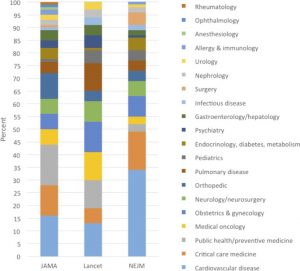Almost 400 medical practices, treatments and procedures have been debunked by studies in leading medical journals, US researchers have shown.
One in ten randomised controlled trials published in the Lancet, JAMA and NEJM between 2003 and 2017 represented a ‘medical reversal’, where the outcomes were negative for an established medical practice, a review has found.
Encompassing more than 3000 journal articles , US researchers identified 396 ‘medical reversals’, representing 6% of all original articles and 13% of all randomised trials reviewed.

‘Medical reversals’ by speciality
Medical reversals were seen most often in areas of cardiovascular medicine (20%) and public health/preventive health (12%), with the most common type of interventions being medication (33%), a procedure (20%), vitamin/supplements (13%) and devices (9%).
The study authors, from the Oregon Health & Science University, said their review was one of the first to specifically look for and compile a comprehensive list of low-value medical practices that have been found in randomised controlled trials to be no better or to be worse than a prior standard of care intervention.
While programs such as Choosing Wisely compiled brief lists of low value interventions in specific specialties, the choices were often based on consensus as much as RCTs, they said.
“We hope these findings propel medical professionals to critically evaluate their own practices and, going forward, demand high-quality research before adopting a practice, especially for practices that are costlier and/or more aggressive than standard of care,” they wrote in eLife.
“The de-adoption of these and other low-value medical practices will lead to cost savings and improvements in medical care.”
Examples of ‘medical reversals’ in the journals: